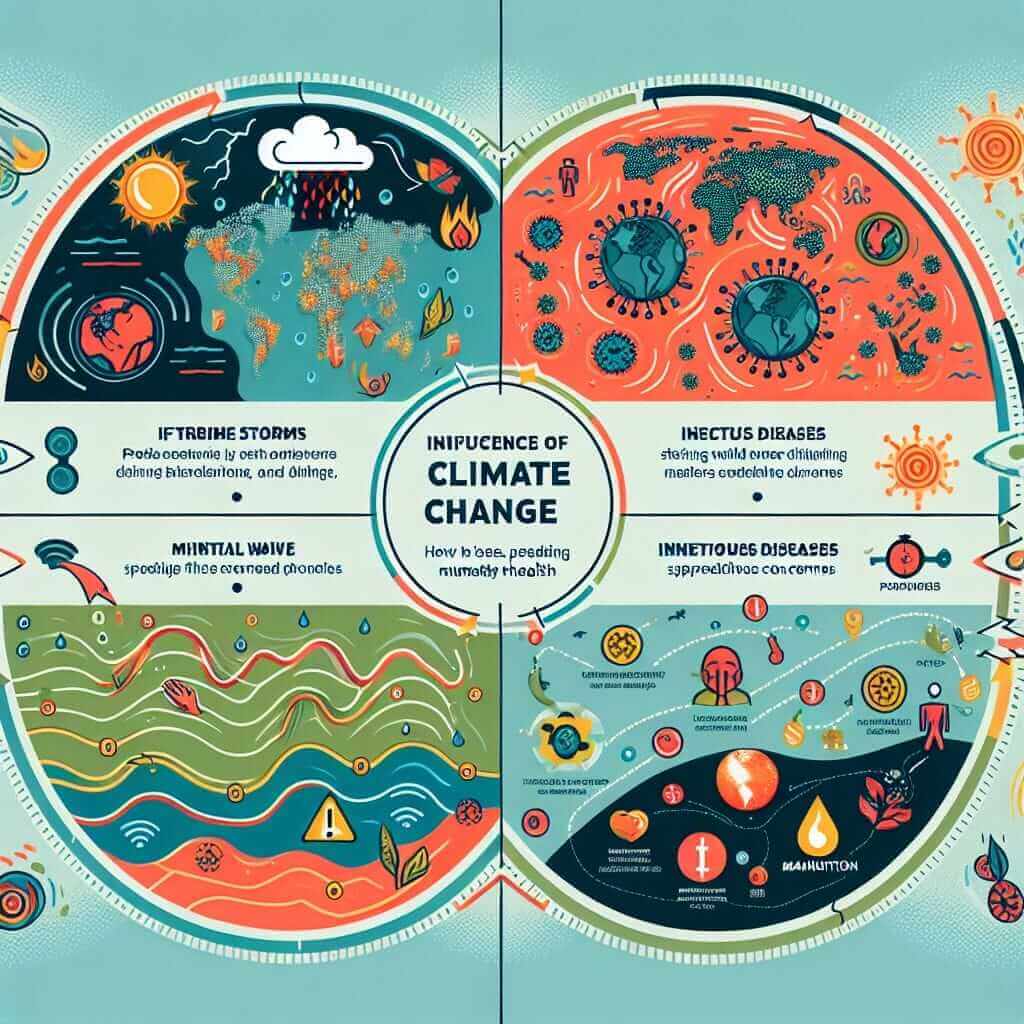Reading is a challenging section of the IELTS exam, testing candidates’ ability to understand and interpret written English. The topic of climate change and its effects on global public health is not only current but also frequently appears in IELTS reading passages due to its relevance and depth.
In this article, we’ll delve into a reading practice exercise based on the timely and impactful topic – “How is climate change influencing global public health?” You’ll also find a comprehensive guide to key vocabulary, grammar points, typical mistakes, and detailed tips to help you prepare efficiently for the IELTS Reading section.
Reading Passage
The Influence of Climate Change on Global Public Health
Climate change is a paramount concern that influences various aspects of life on Earth, one of which is global public health. Increasing temperatures and extreme weather events are creating a range of health challenges worldwide.
Firstly, higher temperatures can exacerbate cardiovascular and respiratory diseases, especially among vulnerable groups like the elderly. Heatwaves, which are becoming more frequent and intense, are particularly dangerous. They cause heat exhaustion, heat stroke, and aggravate pre-existing health conditions.
Secondly, extreme weather events such as hurricanes, floods, and droughts directly impact public health. These events can cause injuries, fatalities, and mental health issues, and they also disrupt health services. For instance, flooding can lead to waterborne diseases which spread rapidly in areas with poor sanitation and limited healthcare infrastructure.
Another significant concern is the geographical redistribution of infectious diseases. Warmer temperatures can expand the habitat of disease vectors. For example, the Aedes mosquito, which transmits dengue and Zika viruses, is now found in areas previously too cool for its survival. This increases the potential for outbreaks in new regions and pressures local healthcare systems unprepared for such diseases.
Agricultural impacts due to climate change also shift food security, leading to malnutrition, especially in low-income countries. Changes in climate influence crop yields, thereby affecting the availability of nutritious food and leading to health consequences like stunted growth in children and increased susceptibility to diseases.
The indirect impacts of climate change on mental health cannot be underestimated. The stress and anxiety from losing homes, livelihoods, and loved ones due to climatic events can lead to severe mental health conditions, including depression and post-traumatic stress disorder.
In conclusion, climate change poses a multifaceted threat to global public health, requiring urgent and coordinated action to mitigate its impacts. This includes reinforcing health infrastructure, improving disease surveillance, and promoting public awareness about the health risks associated with climate change.

Questions
Identifying Information (True/False/Not Given)
- Flooding always leads to an increase in mental health issues.
- The Aedes mosquito has expanded its range due to cooler temperatures.
- Malnutrition is more prevalent in low-income countries due to the agricultural impacts of climate change.
Multiple Choice
- What is the primary cause of heat-related health issues?
a) Air pollution
b) Low immune system
c) Higher temperatures
d) Lack of exercise
Sentence Completion
- Climate change affects mental health by causing stress and anxiety from ____.
- Changes in climate that disrupt food availability can lead to ____.
Matching Information
-
Match the statements with the correct consequence:
a) Higher temperatures
b) Extreme weather events
c) Geographical redistribution of infectious diseasesi. Lead to injuries and disruption of health services.
ii. Exacerbate cardiovascular and respiratory diseases.
iii. Increase potential for new disease outbreaks.
Answer Keys
Identifying Information
- Not Given
- False
- True
Multiple Choice
- c) Higher temperatures
Sentence Completion
- Climate change affects mental health by causing stress and anxiety from losing homes, livelihoods, and loved ones.
- Changes in climate that disrupt food availability can lead to malnutrition.
Matching Information
- a) ii. Exacerbate cardiovascular and respiratory diseases.
b) i. Lead to injuries and disruption of health services.
c) iii. Increase potential for new disease outbreaks.
Common Mistakes in Reading Section
- Misinterpreting Questions: Carefully read the instructions and specific wording in the questions to avoid errors.
- Overlooking Keywords: Pay attention to keywords in both the questions and passage to locate information quickly.
- Assuming Information: Base your answers solely on the content of the passage, not on outside knowledge or assumptions.
Vocabulary Focus
- Exacerbate (v) /ɪɡˈzæsərˌbeɪt/: To make a problem or bad situation worse.
- Vector (n) /ˈvɛktər/: An organism, typically an insect, that transmits a disease.
- Stunted (adj) /stʌntɪd/: Slowed or stopped in growth or development.
- Malnutrition (n) /ˌmælˌnuˈtrɪʃən/: Lack of proper nutrition caused by not having enough to eat or not eating enough of the right things.
Grammar Highlight
- Relative Clauses: Used to provide additional information about a noun. For instance, “which are becoming more frequent and intense” adds information about heatwaves.
- Conditional Sentences: Crucial for hypothesis and outcomes. For example, “If warmer temperatures expand the habitat of disease vectors, it increases the risk of disease outbreaks.”
Advice for IELTS Reading
- Practice Regularly: Frequent practice with varied topics helps improve comprehension and speed.
- Develop Skimming and Scanning Skills: These skills help quickly locate key information without wasting time reading every word.
- Expand Vocabulary: A rich vocabulary makes it easier to understand passages and answer questions correctly.
- Understand Question Types: Familiarize yourself with different question formats and practice strategies to tackle each type efficiently.
By focusing on these strategies and consistently practicing, you can significantly improve your reading skills and ace the IELTS Reading section. For further practice, please check our related articles: What are the impacts of climate change on global public health?, Effects of climate change on human health.